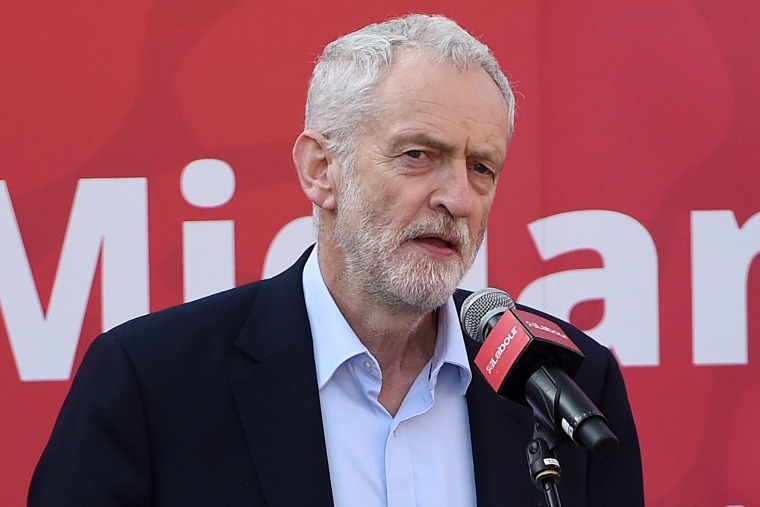SHARM EL-SHEIKH, Egypt — Britain's main opposition party took a big step Monday toward backing a second Brexit referendum amid intensifying concerns the country could crash out of the European Union next month without a deal.
The Labour Party did not specify what voters might be asked to consider in any future vote, though it has previously said the option of Britain remaining an E.U. member would be included.
However, the party's latest position on the question has the potential to alter the course of Brexit a little more than a month before the scheduled withdrawal day.
The E.U. warned Britain it faces the prospect of delaying its planned March 29 departure or the consequences of a chaotic exit. European Council President Donald Tusk, who chairs meetings of E.U. nation leaders, said Monday it would be "rational" to postpone Brexit day.
Labour has proposed its own withdrawal plan as an alternative to the government's deal with the E.U. The party said Monday it would back a second public vote if the House of Commons rejects its plan this week, as is widely expected.
Labour's Brexit plan envisions far closer economic ties between Britain and the E.U. than the agreement Prime Minister Theresa May negotiated, which lawmakers overwhelmingly voted down last month.
Leader Jeremy Corbyn told Labour lawmakers the party "will do everything in our power" to prevent Britain leaving the E.U. without a deal on the country's withdrawal and on the outlines of its future relationship with the remaining 27 members.
But Corbyn also said Labour would oppose any agreement based on the "overwhelmingly rejected" deal that May is trying to resuscitate.
As a result, Labour plans to put forward or support an amendment in Parliament "to prevent a damaging Tory Brexit being forced on the country," he said.
Voters narrowly approved the June 2016 referendum to pull Britain out of the E.U. Labour has said it would only support a second referendum as a last resort if it could not secure a new general election or make changes to May's divorce deal.
The party leadership has been reluctant to change tack, not least because majorities in many of the districts Labour lawmakers represent, particularly in northern England, voted in favor of Brexit.
The change in approach follows the resignations of eight Labour lawmakers last week, partly over the party's failure to back another Brexit referendum. It is likely to cheer many party members, who have backed calls for a so-called "people's vote."
While there is little chance of a second referendum taking place without the support of Labour, the path to another Brexit vote is far from clear. It would require the support of numerous lawmakers from the governing Conservative Party, for example.
Since lawmakers rejected May's deal with the E.U. last month, the prime minister has sought to get changes from Brussels on a provision for the border between the U.K.'s Northern Ireland and E.U. member Ireland.
The mechanism, known as the backstop, is a safeguard that would keep the U.K. in a customs union with the E.U. to remove the need for checks along the Irish border until a permanent new trading relationship is in place.
May wants to revise the deal to reassure opponents from her Conservative Party, as well as from a Northern Ireland party that props up her minority government, the backstop would only apply temporarily.
But E.U. leaders insist that the legally binding Brexit withdrawal agreement, which took a year and a half to negotiate, can't be reopened.
The impasse has raised concerns that Britain will leave the E.U. without a deal, a scenario that would likely mean new tariffs on British exports and serious disruption to trade between the two sides. The Bank of England has warned that the British economy could shrink by 8 percent in the months after a disorderly Brexit.
May has said a new vote on any revised Brexit deal won't be held this week and could come as late as March 12.
A number of British lawmakers are seeking to wrest control of the process from the government and are looking to get support for an amendment that would require May to seek an extension to the Brexit date if Parliament fails to back her deal.
"I don't see how businesses can plan. I don't see how public services can plan, and I think it's just deeply damaging," Labour lawmaker Yvette Cooper, one of those behind the move, told the BBC.
On Monday, the E.U.'s Tusk warned that the chances of a withdrawal agreement being concluded in time are receding, and that sticking by the planned Brexit date would be too risky.
"I believe that in the situation we are in, an extension would be a rational solution," Tusk told reporters at an E.U.-Arab League summit in Egypt after talks with May that he said included discussions over extending the Brexit process.
He said all 27 member states "will show maximum understanding and goodwill" to make possible such a postponement — a decision that requires unanimity.
May insists a deal in time is possible.
"It is within our grasp to leave with a deal on 29th of March and I think that that is where all of our energies should be focused," May said.
She said that "any delay is a delay. It doesn't address the issue."
Dutch Prime Minister Mark Rutte warned her against "sleepwalking" into a chaotic Brexit next month.
"It's absolutely unacceptable. And I think your best friends have to warn you for that," Rutte told the BBC. "Wake up. This is real."
Raf Casert reported from Brussels. Pylas and Jill Lawless contributed from London.



